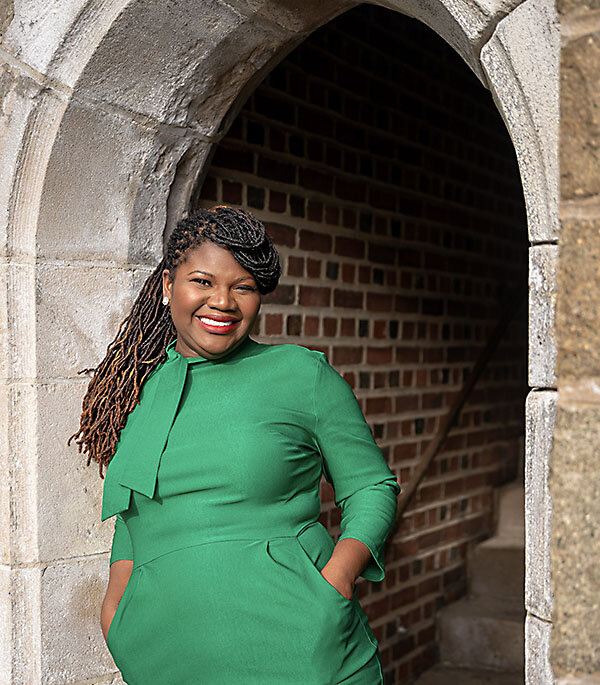Welcome back to college, pandemic students. This year is different.
Loading...
During the pandemic, colleges and universities made instructional, financial, and organizational pivots. But with high school graduation rates dropping and the national exam of fourth and eighth graders showing steep learning losses in math, many students are arriving on campus less prepared for the rigors of college. Mental health issues, anxiety, and a lack of study skills are common, and administrators say help is needed with everything from algebra to workload management.
Colleges are bolstering academic support, tutors, and mental health staff in an effort to help students reach the standards they need. Professors say they find themselves having to show grace – and worrying that if they show too much, they’ll hurt their students’ career prospects.
Why We Wrote This
A story focused onWhat’s the best way to help pandemic-era college students who arrived less prepared than previous years? Colleges add tutors, mental health resources – and a measure of grace.
At the University of Maryland, Baltimore County, which focuses heavily on STEM, professors started noticing more withdrawals and low grades. Administrators added more college preparedness classes and hired at least 30 new academic tutors.
“What we’re seeing is that students may be coming with slightly lower preparation in math. We’re seeing students who maybe are coming with slightly lower high school GPAs than might have in previous years, because things were different in high school during online learning,” says Delana Gregg, director of academic learning resources, assessment, and analysis.
It has been challenging for Asia Alexander to gain perspective on how college used to be, pre-pandemic.
The 19-year-old Howard University sophomore doesn’t know how things used to be, frankly, because she was still in high school when COVID-19 hit. She finished her freshman year with a 3.8 GPA, attributed some to her smarts and some to a lighter workload. This school year, things changed.
“I just think the way the world shifted and coming back to college and the way the older teachers are trying to unshift it is really aggravating,” Ms. Alexander says. “We’re not used to doing regular school anymore.”
Why We Wrote This
A story focused onWhat’s the best way to help pandemic-era college students who arrived less prepared than previous years? Colleges add tutors, mental health resources – and a measure of grace.
Ms. Alexander is one of many undergraduate students in the United States who spent their senior year distance learning during the pandemic. As learning and teaching changed in schools across the country, they had to learn both online and in person. School rituals changed, and some students got used to lighter workloads, which teachers doled out in hopes of not short-circuiting students’ brains amid a worldwide emergency.
Every college and university made instructional, financial, and organizational pivots. But with high school graduation rates dropping and the national exam of fourth and eighth graders showing steep learning losses in math in every state, many students are arriving on campus less prepared for the rigors of college. Mental health issues, social anxiety, and a lack of study skills are common, and faculty and administrators say help is needed with everything from algebra to workload management.
“What we’re seeing is that students may be coming with slightly lower preparation in math. We’re seeing students who maybe are coming with slightly lower high school GPAs than might have in previous years, because things were different in high school during online learning,” says Delana Gregg, director of academic learning resources, assessment, and analysis at the University of Maryland, Baltimore County.
During the first year of the pandemic, schools initially cut staff. Now, they are bolstering academic support, tutors, and mental health staff in an effort to help students reach the standards they need. Professors say they find themselves having to show grace – and worrying that if they show too much, they’ll hurt their students’ career prospects.
Learning while the entire system is stressed
At Wellesley College in Massachusetts, Kellie Carter Jackson felt like some of her students had lost hope. She saw a change in their energy level, concentration, and class participation. Instead of chalking up multiple blown deadlines to young people lacking discipline and not taking things seriously, she helped them journey on.
For example, when some of her students seemed unable to write a 15-to-20-page paper on the different manifestations of Black rebellions in the U.S. in the face of white supremacy, instead of giving F’s (unheard of for Wellesley students), she gave incompletes and long extensions.
“I think that preparedness and mental health go hand in hand, because I don’t think you can write that paper the way that it needs to be written if you are depressed, or you have anxiety, and a lot of these students do,” Dr. Carter Jackson says. For spring semester 2022, she had seven incompletes, including four in a class of eight students.
Ms. Alexander, the Howard student, agrees that the pandemic affected her mental health. Nothing was more difficult than her very first semester in Washington, D.C., in the fall of 2021. She was 900 miles away from her hometown of Tallahassee, Florida, and she wasn’t able to meet new people. Classes were online, dormitory visitation was suspended, and students tested weekly in order to eat in the cafeteria or go to the library or gymnasium.
“I know I’m not the only one who experienced that bad social experience last year. We were stuck in our rooms all day, it was really depressing,” she says.
With a scholarship to maintain, Ms. Alexander is working to duplicate the 3.8 GPA from freshman year, but the 3.5 she got last semester from a less desirable grade in a Spanish class was a gut punch to remind her that it won’t be as easy.
Freshman year “was like, ‘OK, you’re coming out of COVID. We’re not going to kill you,’ but this semester they’re literally trying to kill us,” Ms. Alexander moans exaggeratedly.
What does this crime scene look like? More tests. More demanding work. Less hand-holding. Zoom from the comfort of a dorm room has been replaced by hard deadlines.
“It’s been so long since I had to memorize something and present it in front of class,” she says. “And I hate paper tests. You can’t finesse them. You can’t get the easy way out on them.”
Still, when asked about her fall semester, Ms. Alexander says she would give it an 8 out of 10.
“Let’s figure out what’s not working”
At the University of Maryland, Baltimore County, which focuses heavily on STEM, professors started noticing more withdrawals and low grades. Administrators added more college preparedness classes and hired at least 30 new academic tutors.
Dr. Gregg’s office provides tutoring, study sessions, academic support courses, and academic advocacy. They offer five sections of a class called Academic Success for Lifelong Learning. Each section has 20 to 30 students, and it is recommended for new students who had a bad first or second semester.
“Essentially what the course does is, we tell students to take a breath. Let’s pause. Let’s figure out what’s not working. And let’s figure out how we can help you get connected to resources on campus and change behaviors so you can accomplish your goals,” Dr. Gregg says.
UMBC is seeing students with sets of strengths like resiliency, she adds. Students meet weekly for the course. They journal and reflect on what’s not working. They work on time management skills and how to study. They get connected to the counseling center and the financial aid office if money is an issue.
UMBC administrators forecast the pandemic’s effect on incoming students and hypothesized on how it would hurt retention if they didn’t act. They reformatted classes. One example: a freshman chemistry course with 300 students. The workload requires students to do a lot of work outside of class. The teacher restructured the class so each week students are essentially given benchmarks for how much to practice and study.
“At first they’re like, ‘Aw, how come you’re making us do all these practice problems,’ but then they get the quiz and they’re like, ‘Oh, this is why you wanted us to practice,’” Dr. Gregg says, laughing.
The fall 2021 freshmen class was 2,035 with a 95% retention rate. For fall 2022, 2,130 new students enrolled, which is a record.
At Wellesley, Dr. Carter Jackson sees some improvement – thankfully, she says, she didn’t have to give any incompletes for fall semester 2022. In the long term, she worries about what four years of giving grace to students would do to them when they graduate and are faced with finding jobs. Until that is figured out, she thinks the immediate calling for professors is to step up their instruction.
“I think there’s a way you can compel excellence out of someone, even in the midst of trying times,” she says.
How do you do that? She suggests teaching to the whole person and showing them the value of what they are learning – whether it’s poetry or molecular biology.
“It means not only do they have to step up as students,” she says, “but we have to step up as professors and show them the unity and the purpose behind what it is that they are learning.”









